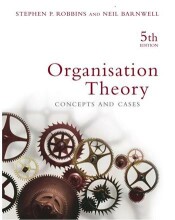Summary: Organisation Theory : Concepts And Cases | 9780733974717 | Stephen P Robbins, et al
- This + 400k other summaries
- A unique study and practice tool
- Never study anything twice again
- Get the grades you hope for
- 100% sure, 100% understanding
Read the summary and the most important questions on Organisation theory : concepts and cases | 9780733974717 | Stephen P. Robbins and Neil Barnwell.
-
1 Part 1 Introduction to Organisation Theory
This is a preview. There are 9 more flashcards available for chapter 1
Show more cards here -
1.1.3 Positivism, postmodernism and critical theory
This is a preview. There are 6 more flashcards available for chapter 1.1.3
Show more cards here -
What did Marx and Engels say about the modernism
It was just a passing phase of economic organization, one stage in an evolution.
-
What do postmodernism and critical theory have in common?
They draw on the idea of the evolution of capitalism to another state.
-
1.2.1 Developing a framework
This is a preview. There are 5 more flashcards available for chapter 1.2.1
Show more cards here -
How did Galbraith define uncertainty?
As the difference between the amount of information required to perform a task and the amount of information already possessed by the organisation.
-
1.2.2 Early contributions
This is a preview. There are 7 more flashcards available for chapter 1.2.2
Show more cards here -
When and what is and means the first systematic analyses of the basis of modern organisational life.
In the 18th century, Devision of labour, breaking down of tasks into simple components which can be undertaken on a repetitive basis by job specialists.
-
1.2.3 From 1900 to the 1930s - early management theories
-
What was the main aim of theorists during the 1900 - 1930s according to management theories?
Identify universal principles and management techniques that could be applied to management.
The Need to reduce production costs, which leaded to improving efficiency.
Achievement of rational goals with closed system perspective.
Focus of analysis was work practices.
-
1.2.3.1 Frederick Taylor and scientific management
-
What includes the theory that marked the beginning of serious theory building in the field of management and organisations?
It was Frederick Winslow Taylor's Principles of Scientific Management in 1911.
-
What is the main aim of scientific management?
Main aim: significant increasing in productivity.
Is's a movement initiated by Frederick Teylor to achieve production efficiencies by systematising and standardising jobs to achieve the 'one best way' they should be done.
-
1.3 Chapter 3 Organisational effectiveness
This is a preview. There are 1 more flashcards available for chapter 1.3
Show more cards here -
What are the features of the organizations of antiquity?
Hierarchy of management, symbols of rank and position, functional areas charged with undertaking specialized tasks, often the development of common culture associated with the sharing of values and goals.
-
What is meant by organizational effectiveness
The extent to which organisation reach their long and short term goals
-
1.3.1 Importance of organisational effectiveness
This is a preview. There are 4 more flashcards available for chapter 1.3.1
Show more cards here -
4 kinds of disciplines in the administrative science helping the management making organisations more effective
- Marketing (identifying market needs and promoting and selling products)
- Financial concepts (make the optimum use of fund invested in the organisation)
- Production and operations management (designing efficient production process and controlling supply chains)
- Accounting principles (providing information that can enhance the quality of the decision making)
- Higher grades + faster learning
- Never study anything twice
- 100% sure, 100% understanding

































